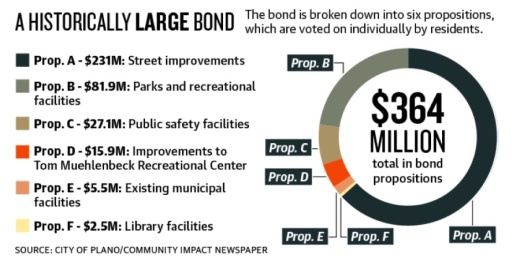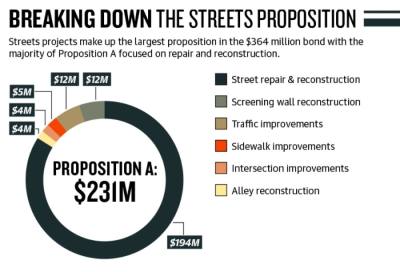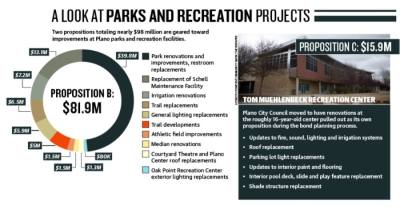More than half of the bond—$231 million—is dedicated to street improvements, including reconstruction and overlay for many aging streets as well as traffic improvements. Infrastructure upgrades at parks and recreation facilities make up a bulk of the remaining costs with roughly $98 million in projects between two propositions.
If the bond passes in its entirety, staff estimates a maximum tax impact of just under $70 for the average Plano homeowner by fiscal year 2024-25. Voter-approved bond funds from past elections are running out, which means the city must request the sale of more debt to carry out much-needed capital projects, City Manager Mark Israelson said.
Forming the bond
The city of Plano has reached an age and traffic level where repairs are a continuous part of keeping roads and facilities in good condition, Engineering Director Caleb Thornhill said.
Nearly 50% of Plano’s streets were built at least 30 years ago, according to staff reports. By regularly updating the city’s roads, staff is able to extend the life of streets for up to a third of the cost of complete reconstruction, Assistant Public Works Director Dan Prendergast said. For example, asphalt overlays cost roughly $2 million per mile, while replacement costs about $13 million per mile. Maintenance projects also take about a quarter of the time compared to a replacement project, Prendergast said.
Current bond plans include up to 50 miles of rehabilitation work on major streets as well as work on smaller streets in up to 14 residential areas, totaling $170 million in maintenance.
The remainder of the proposition goes toward streets that need full reconstruction as well as alley, sidewalk, intersection, traffic system and screening wall improvements.
Increased construction costs mean it is likely street improvement projects will become more expensive over time, Thornhill said.
As one of the fastest-growing regions in the nation, cities in Dallas-Fort Worth must take on a comprehensive approach to ensure transportation systems continue to work well, said Michael Morris, director of transportation with the North Central Texas Council of Governments. The council monitors infrastructure and works with local governments to ensure continued use of roadways, he said.
“It is crucial to maintain the infrastructure we have as a first priority,” Morris said. “As cities mature, more of the existing roadway network requires greater attention.”
The Plano Parks and Recreation Department is facing the same challenge maintaining facilities, Park Planning Manager Renee Jordan said.
“Aging infrastructure is really the biggest focus of the parks and recreation bond program,” she said. “We have 80 parks that are in operation, and those need maintenance.”
Every 20 years is generally when facility replacements and large-scale improvements need to occur, Jordan said. The department bases updates and trail construction on its parks master plan, which dictates future use and goals for facilities and includes matrices that define facility and trail conditions.
Bond propositions include repairs and reconstruction at athletic fields, 11 park playgrounds, five trails and three bathrooms. Major renovations to the Tom Muehlenbeck Recreation Center make up their own $15.9 million proposition. Multiple projects at the same location would be done concurrently to save on costs and expedite closures, Jordan said.
Some projects can be funded in other ways, but the bond is designed to plan out larger-scale items in advance of needing the funds during future budget seasons, Budget Director Karen Rhodes-Whitley said. Large projects, such as the recreation center renovations, will not happen in the next four years if they are not funded by the bond, she added.
Resident inclusion
Another change to the bond creation process in recent years is the inclusion of the 2021 Bond Referendum Citizen Advisory Committee. Israelson implemented this step after more than 30 years without a citizen input group.
“I felt it was very important ... to involve a citizen committee ... [to] really [talk] about the impact of what that referendum could mean for the community not only in cost but also in quality of life,” he said.
The committee, which includes members nominated by Plano City Council, was one of many boards, commissions and committees to weigh in on the bond.
Public outreach recently began in person and online to help voters better understand the bond. This includes information on tax implications, which are difficult to estimate with certainty, Rhodes-Whitley said, because property values are subject to change. The city has historically projected increases in tax rates from bonds but has only once increased the rate following the economic recession in 2009, she said.
As a longtime involved resident, Janet Stovall said she found being a part of the citizen committee to be extremely educational and urged other residents to stay informed.
“It’s just like [maintaining] your house,” Stovall said. “It’s expensive running a city, but that’s why we’ve got to have good people [on staff], and that’s why citizens need to stay alert and educated.”







